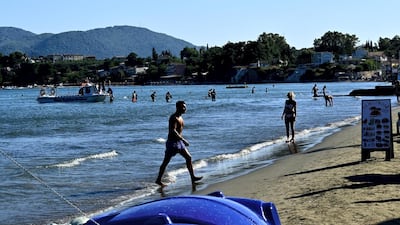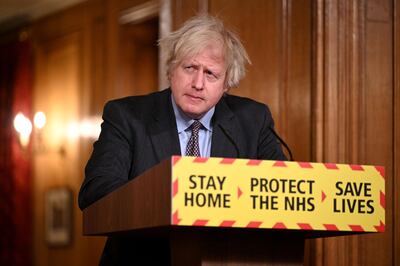Travel bookings surged after UK Prime Minister Boris Johnson announced plans to restart the economy and society.
Mr Johnson said on Tuesday that he was "very optimistic" that his road map for ending lockdown in England would succeed.
He announced on Monday that the UK was on on a “one-way road to freedom”, paving the way for holidays to resume as soon as May 17 after a review.
Other parts of the economy will restart “cautiously and irreversibly” in four stages between early next month and mid-June, he said.
Under the plan, schools will reopen on March 8 and limits on social contact will be removed by June 21.
Despite the potential for delays to the reopening dates, travel companies reported a rush in people booking overseas holidays.
Tui said it had had its best day of bookings in over a month, with strong interest in Greece, Spain and Turkey for the summer.
Thomas Cook said traffic to its website increased by more than 100 per cent after Mr Johnson started speaking, with bookings “flooding in” for Greece, Cyprus, Mexico and Dominican Republic.
EasyJet also reported a 337 per cent rise in flight bookings and a 630 per cent jump in holiday bookings for destinations such as Alicante, Malaga, Palma, Faro and Crete.
Bookings are strongest for August, followed by July and then September.
Mr Johnson said on Tuesday senior minister Michael Gove would lead a review to thrash out the "scientific, moral, philosophical, ethical" question of vaccine certificates for those who have received a coronavirus shot.
"There are deep and complex issues that we need to explore, ethical issues about what the role is for government in mandating all people to have such a thing," he said.
"We can't be discriminatory against people who, for whatever reason, can't have the vaccine. There might be medical reasons why people can't have a vaccine ... some people may genuinely refuse to have one."
He added that form of vaccine passport would be "going to come on the international stage whatever" for foreign travel.
Health Secretary Matt Hancock said the review of overseas travel would consider the effect of any new Covid-19 variants.
“If the vaccine works well against them, we can be much more relaxed about international travel,” he told Sky News. “If it doesn’t work, things will be much more difficult.”
The government’s road map rules out domestic holidays over Easter but states they can resume from April 12 at the earliest.
The British tourism industry is expected to boom once restrictions are lifted, with a spike in "staycations" while international travel remains off the cards.
Paul Charles, of travel consultancy The PC Agency, said Monday’s announcement would “fill up the diaries of every holiday let within 24 hours”.
"I would expect demand to skyrocket for those weeks after April 12. It's the message that the travel sector wanted from the PM," he told The Telegraph.
Visit Britain director Patricia Yates said the road map had given the industry some certainty.
"I think the industry will be reassured with the road map and they can start planning, and also that people have confidence that they can book now for the summer, certainly for a domestic break," she said.
Dr Mike Tildesley, an infectious disease modeller who advises the government, said the reopening of society might be postponed if there is another marked rise in coronavirus cases.
"There needs to remain the possibility to hold off for a couple of weeks so we get things in control, particularly if the government wants to have this 'one-way route to freedom', which I think in itself is potentially a little bit uncertain," he told BBC Radio 4's Today programme.
“It may have to have some measures introduced for a little bit of time in order to prevent these surges of infection occurring so that ultimately we can take a one-way route back to normality.”
Mr Johnson said eliminating Covid-19 wasn’t feasible, and lockdown restrictions could restrictions could not be maintained indefinitely, so they would be lifted with caution.
“There is therefore no credible route to a zero-Covid Britain or indeed a zero-Covid world. And we cannot persist indefinitely with restrictions that debilitate our economy, our physical and mental well-being and the life chances of our children,” he told MPs.
“And that is why it is so crucial that this roadmap is cautious but also irreversible. We’re setting out on what I hope and believe is a one-way road to freedom.”
The roadmap would pass through four stages over five weeks to allow the effects of easing restrictions to be measured.
Chris Whitty, chief medical officer for England, said infections and deaths could become a problem in the next few winters even with widespread vaccination.
The key dates include:
Stage one
March 8
All pupils and students allowed to return to schools, colleges and universities in England, as well as after-school and before-school clubs. Secondary-school pupils, aged 11 to 16, will be tested for coronavirus twice a week.
Two adults from different households will be allowed to meet outdoors for a coffee or to sit down on a park bench: until then, such a meeting is for exercise only.
Care home residents will be allowed one regular, designated visitor.
March 29
Two families of any size can meet outdoors, including in private gardens. The “rule of six” will apply if people from more than two households are meeting.
Outdoor sports such as tennis, golf and grassroots football can resume.
The stay-at-home order will end, with government messaging changing to “stay local”.
People are still encouraged to work from home where possible, while overseas holidays are still banned.
Stage two
April 12 at the earliest
Non-essential retail to reopen, as well as hair and beauty salons.
Public buildings such as libraries and museums will reopen, as will outdoor attractions, including zoos and theme parks. Wider social contact rules apply in all of those settings: people can attend indoor venues only alone or with members of their own household.
Indoor leisure facilities such as gyms and pools to reopen.
Hospitality venues including pubs and restaurants will reopen for outdoor service only. Two families of any size or six people from more than two households can visit. There will be no curfews on hospitality and alcohol can be served without food, unlike in the previous easing of restrictions in November. Customers will still have to be seated when they order food or drink.
Self-contained accommodation such as campsites and holiday lets to reopen but indoor facilities shared with other households must stay closed. Funerals can continue with up to 30 people. Attendance at weddings and wakes rises from six to 15.
Stage three
May 17 at the earliest
The earliest date at which foreign travel can resume, pending a review.
Most outdoor social contact rules can be lifted, but gatherings of more than 30 people in parks and gardens will remain illegal. Indoor mixing allowed for two households of any size or six people from more than two households. Indoor hospitality, hotels and bed and breakfasts can reopen, with two households allowed to mix.
Entertainment venues, such as cinemas and children’s play areas, can reopen and indoor sports groups and exercise classes can resume. Indoor performances and sporting events can host crowds of up to 1,000 people or be half full, whichever is lower. Outdoor venues and sporting events can host crowds of 4,000 or be half full, whichever is lower. Larger outdoor venues, such as the biggest soccer stadiums, can host 10,000 people or be a quarter full, whichever is lower. Up to 30 people can attend weddings, receptions, wakes, funerals and other events, such as bar mitzvahs and christenings.
Stage four
Before June 21
Review to report on whether Covid vaccine certificates can play a role in reducing restrictions on social contact and reopening the economy. Review to report on social distancing measures, including on use of face masks and working from home.
June 21 at the earliest
All limits on social contact to be lifted. All remaining sectors of the economy, including nightclubs, allowed to reopen. Restrictions on large public events, such as concerts, and large private gatherings such as weddings, will be lifted.



